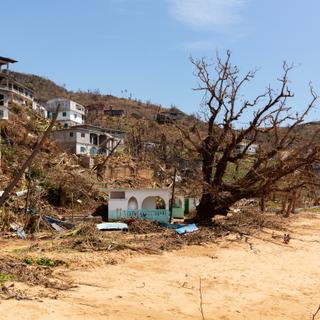


Mayotte's 'forgotten' residents feel abandoned after Cyclone Chido
NewsA week after Cyclone Chido tore through the northwest of the French overseas territory in the Indian Ocean, the area's devastated towns have still seen no sign of help. As well as anger and feeling abandoned, improvised acts of solidarity are being set up.
The majestic tropical almond tree that stands on Mtsangadoua beach, one of the island's most beautiful, was now bent at an awkward angle. Facing the mosque, the hundred-year-old tree, which had long been appreciated for the shade provided by its thick, round leaves, bore Cyclone Chido's wounds. Yet it has resisted. This was symbolic for Ali Houzainya, who praised the solidarity of Mayotte's people after this unprecedented disaster struck the Indian Ocean island, after a litany of other crises.

"Fortunately, we can count on ourselves to get through this," said the energetic woman, a main education advisor, before denouncing, in contrast, "the absence of local authorities and the state." "On Petite-Terre [the smaller island of Mayotte], distributions have begun. Here, there's nothing. It's not normal," she said, standing beside her brother, who was grilling pieces of chicken: Their last food reserves, defrosted by the lack of electrical power and soon to expire, which they didn't want to lose out on. "We saw the helicopter go by and that's it. We've been abandoned. Where's the mobilization of the municipality, where's the mobilization of the state?" she asked.
This combination of dismay and anger is widespread in the north-western part of Mayotte – an isolated and impoverished area. On Saturday, December 14, from 10 pm, the eye of the cyclone – a relatively calm low-pressure area, surrounded by a ring of atmospheric disturbances representing the storm's most dangerous and devastating aspects – passed right through the territory, with winds rising to over 200 kph. First, the part of the storm known as the "eyewall" hit the area, followed by a 30-minute lull in events before the other part of the wall struck.
You have 81.85% of this article left to read. The rest is for subscribers only.
